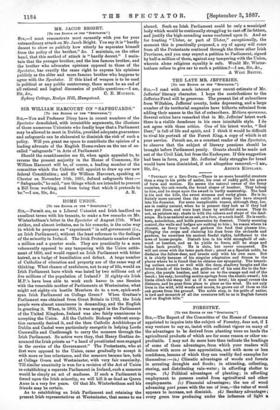HOME UNION.
[To Tea EDITOR OP THE SPECTATOR:] S114—Permit me, as a Liberal Unionist and Irish landlord on excellent terms with his tenants, to make a few remarks on Mr. Winterbotham's letter in the Spectator of August 27th. What strikes, and almost irritates, me in his remarks, is the calm way in which he proposes an " experiment " in self-government (i.e., an Irish Parliament), without the least reference to the feelings of the minority in Ireland. The Irish Protestants number about a million and a quarter souls. They are practically to a man vehemently opposed to any tampering with the Union settle- ment of 1800, and would regard an Irish Parliament with bitter hatred, as a badge of humiliation and defeat. A large number of Catholics of education and property are of the same way of thinking. What chance of usefulness, not to say of life, would an Irish Parliament have which was bated by two millions out of five millions of the population of Ireland ? If eighty-six Irish M.P.'s have been able to work such havoc in one Session with the venerable mother of Parliaments at Westminster, what might not eighty-six hostile Members do to a new, spick-and- span Mali Parliament on College Green P When Grattan's Parliament was obtained from Great Britain in 1782, the Irish people were almost unanimous in demanding, and the English in granting it. When, in 1800, it was merged in the Parliament of the United Kingdom, Ireland was also fairly unanimous in accepting the Union. All the Catholic Bishops without excep- tion earnestly desired it, and the then Catholic Archbishops of Dublin and Cashel were particularly energetic in helping Lords Cornwallis and Castlereagh to carry the measure through the Irish Parliament. So active were they, that Henry Grattan de- nounced the Irish priests as "a band of prostituted men engaged in the service of the Government." The Protestants, who at first were opposed to the Union, came gradually to accept it with more or less reluctance, and the measure became law, both at College Green and Westminster, with very fair unanimity. Till similar unanimity is won for a revision of the Act of Union re-establishing a separate Parliament in Ireland, such a measure would be simply an act of madness. If such a Parliament is forced upon the Irish minority, we will kill it as dead as Queen Anne in a very few years. Of that Mr. Winterbotham and his friends may be certain.
As to establishing an Irish Parliament and retaining the present Irish representatives at Westminster, that seems to me
absurd. Such an Irish Parliament could be only a municipal body which would be continually struggling to cast og its fetters, and justify the high-sounding name conferred upon it. And as for treating "Ulster, or part of Ulster," exceptionally, the moment this is practically proposed, a cry of agony will come from all the Protestants scattered through the three other Irish Provinces, and you may expect a petition to Parliament, signed by half-a.million of them, against any tampering with the Union, wherein alone religious equality is safe. Would Mr. Winter- botham refuse to give ear to such a petition P—I am, Sir, &a,
A WEST BRITON.


































 Previous page
Previous page